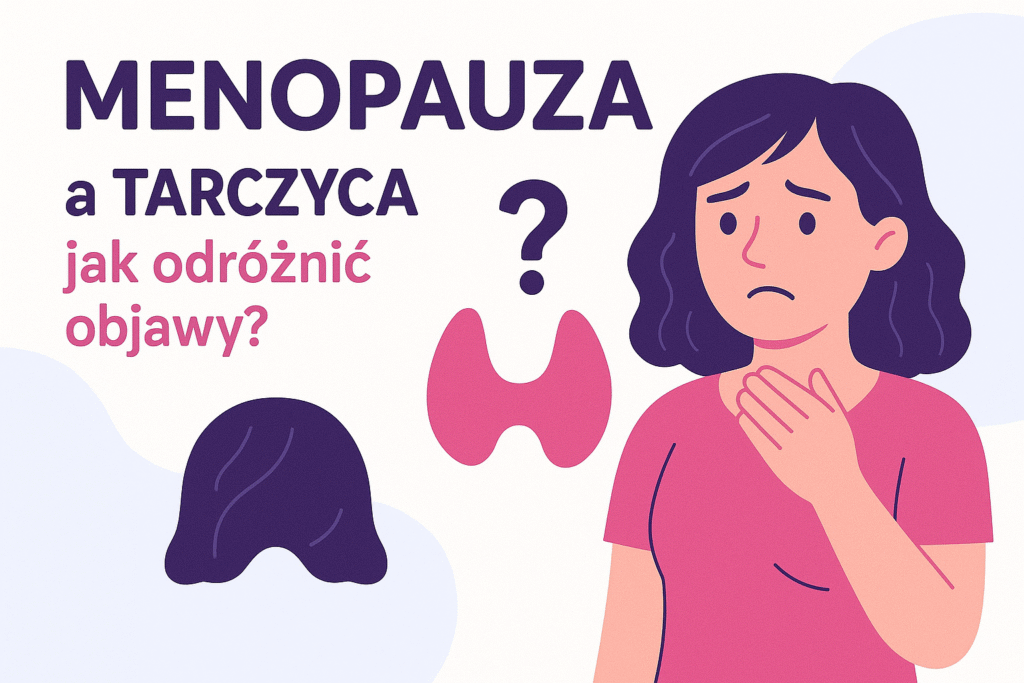Why are menopause and hypothyroidism often confused?
Menopause and thyroid disorders, especially hypothyroidism, have many common symptoms. Both of these conditions affect the hormonal system and can cause similar symptoms – both physical and mental. This means that many women are unaware of whether their worsening mood is “just menopause” or an untreated thyroid condition.
Both menopause and hypothyroidism occur most often between the ages of 40 and 60, and their co-occurrence is quite common. What’s more, the hormonal changes associated with menopause can even affect the functioning of the thyroid gland1.
Symptoms Common to Menopause and Hypothyroidism
- fatigue and lack of energy
- mood swings, irritability, depression
- weight gain despite no change in diet
- sleep problems
- “brain fog”, difficulty concentrating and remembering
- decreased libido
- dry skin
- menstrual disorders (in early menopause)
Symptoms typical of hypothyroidism
- feeling cold even when others are warm
- slowing of movements and speech
- obrzęk twarzy i powiek
- constipation
- dry and brittle hair, loss of the outer parts of the eyebrows
- low blood pressure
- low heart rate
- unexplained infertility (premenopause)
Typical symptoms of menopause
- hot flashes and night sweats
- irregular periods or their complete disappearance
- vaginal dryness and pain during intercourse
- increased hormonal irritability (suddenly changing mood)
- increased LDL cholesterol levels (especially after menopause)
- sleep disorders associated with night sweats
Why is it worth checking your thyroid during menopause?
Many women in menopause also suffer from latent or untreated hypothyroidism – often associated with Hashimoto’s disease. This autoimmune disease can become active during periods of strong hormonal changes. It is estimated that up to 1 in 5 women over the age of 50 have elevated TSH2.
Recommended tests:
- TSH (thyroid-stimulating hormone) – a basic indicator of thyroid function
- FT4 and FT3 – free thyroid hormone levels
- anti-TPO and anti-TG – antibodies typical of Hashimoto
- Thyroid ultrasound – assessment of structure and presence of changes
What if both things occur at the same time?
This is not uncommon. In such a case, a comprehensive approach is necessary:
- TSH level control and possible levothyroxine treatment
- use of hormone replacement therapy (HRT) or phytohormones if indicated
- a diet that supports the thyroid and hormonal system (rich in iodine, selenium, zinc, vitamin D)
- monitoring your well-being and your body’s response to treatment
Important: HRT and thyroid treatment should be carried out under the supervision of two different specialists – a gynecologist and an endocrinologist – who work together.
Summary
Symptoms of hypothyroidism and menopause often overlap, which can lead to misdiagnosis. Women in the perimenopausal period should have their thyroid hormone levels routinely checked, especially if they complain of depressive symptoms, fatigue, and weight gain. Informed diagnosis allows not only to improve the quality of life, but also to prevent more serious health complications in the future.
Footnotes
1 Poppe K et al. Thyroid disorders in the elderly. Rev Endocr Metab Disord. 2009;10(2):131–142.
2 Vanderpump MPJ. The epidemiology of thyroid disease. Br Med Bull. 2011;99(1):39–51.
3 Spencer CA et al. National Health and Nutrition Examination Survey data. Thyroid. 2005;15(3):210–220.
4 Davis SR et al. Diagnosis and management of menopause: The Endocrine Society Clinical Practice Guideline. J Clin Endocrinol Metab. 2015;100(11):3975–4011.

